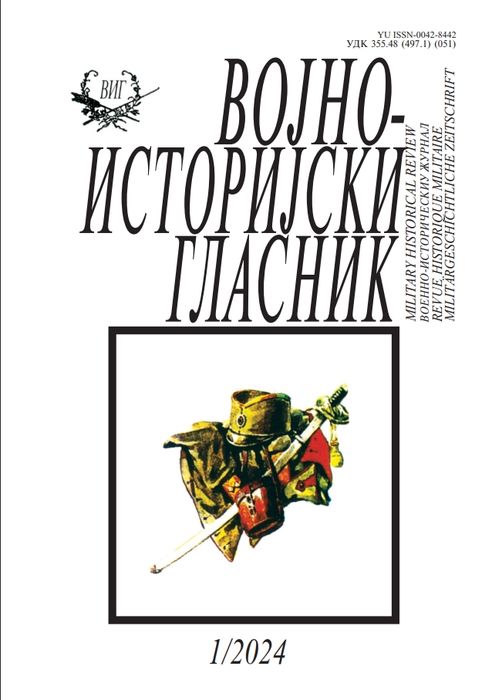Проблеми домаћег старешинског кадра представљени у листу "Српска Војска" (1908-1912)
PROBLEMS OF THE NATIONAL MILITARY LEADERSHIP PRESENTED IN THE “SRPSKA VOJSKA” (“SERBIAN ARMY”) NEWSPAPER (1908-1912)
Author(s): Milić J. MilićevićSubject(s): Military history, Between Berlin Congress and WW I
Published by: Institut za strategijska istraživanja
Keywords: Serbian army; independent military press; educational and social problems of military staff; critics
Summary/Abstract: During its four-year appearance (1908-1912), the independent military newspaper „Srpska vojska” (Serbian Army) raised several topics. Most often it published articles about Austria-Hungary due to its annexation of Bosnia and Herzegovina. Along with these, there were frequent reports about many foreign armies and waged wars, and especially about recently finished Russo-Japanese war. The„ Srpska vojska” newspaper was a collage type magazine addressed to Serbian officers and NCO‘s but also to the other patriotic members of those days Serbian society. In addition to the mentioned general topics, many writings dealt with the issues related to the Serbian army, often laced with a critical tone. It was primarily related to the military personnel, both officers and NCO‘s. Along with the remark that the one and the other personnel are numerically insufficient, many anonymous authors also pointed out other problems, among which two basic ones prevailed. In the case of officers, it was about uneven military knowledge conditioned by the different origins of its acquisition. Namely, some, primarily junior officers, were promoted from the ranks, while others were graduates of the Military Academy. Fewer were those educated or trained abroad. It was also considered that noncommissioned officers needed more knowledge, but the causes were sought in their previous insufficient civilian education. Another problem common to both categories of military leadership was their relatively weak material position, the cause of which, however, was different. In the case of officers, these were significant material obligations, much more than for civilians, while the noncommissioned officer cadre suffered due to low salaries. Citing these causes, the authors proposed specific solutions, most often uncritically offering the models of considerably wealthy European armies.
Journal: Vojnoistorijski glasnik
- Issue Year: 2024
- Issue No: 1
- Page Range: 59-74
- Page Count: 16
- Language: Serbian

